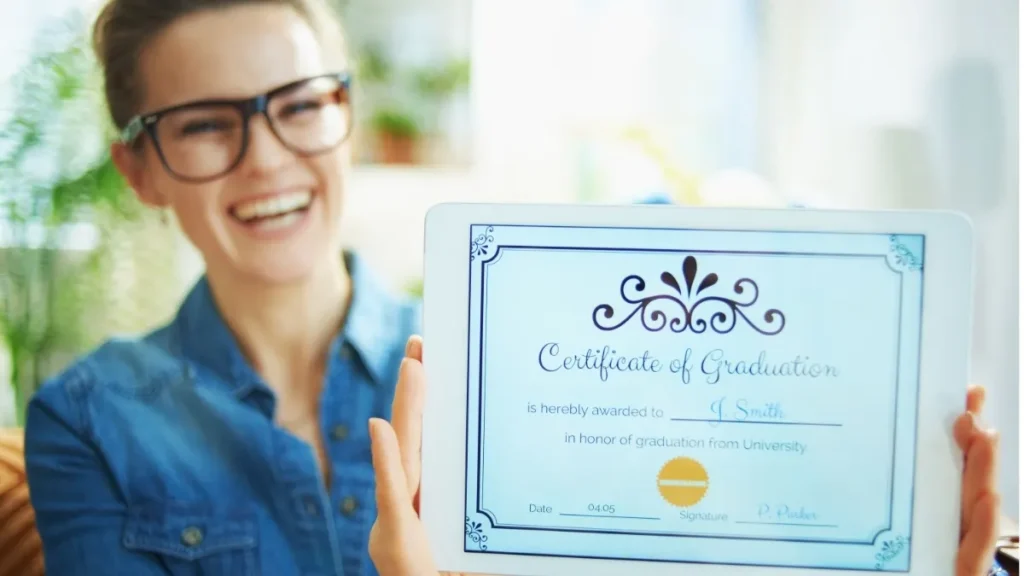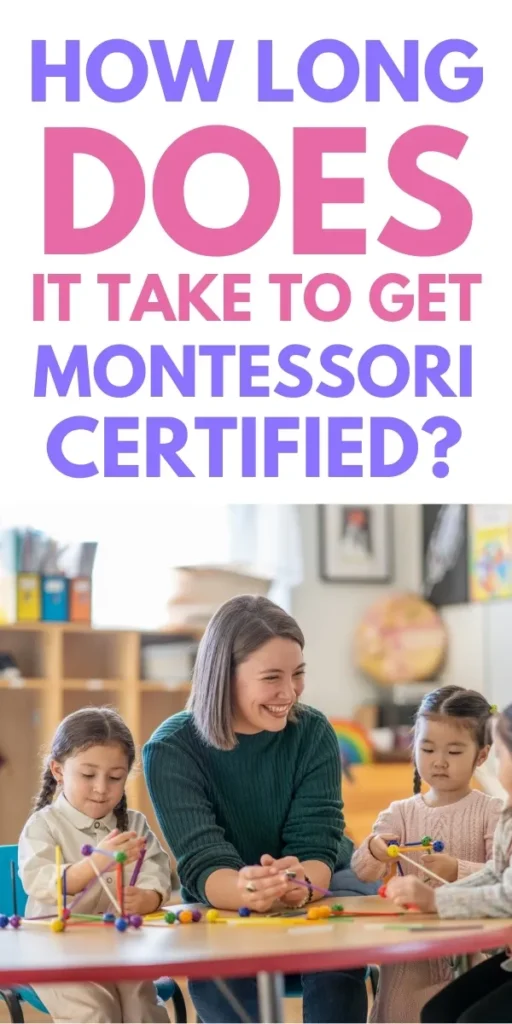Maria Montessori‘s revolutionary educational philosophy has captivated parents and educators for over a century.
But for those drawn to the world of Montessori teaching, a burning question often arises: how long does it take to get montessori certified?
Understanding the path to Montessori certification can feel like navigating a tangled jungle of acronyms and varying program lengths. Fear not, intrepid explorer!
This guide shines a light on the different avenues to Montessori certification, revealing the time commitment involved in each and empowering you to chart your own path with clarity.
How Long Does It Take To Get Montessori Certified?
Becoming a Montessori-certified teacher typically takes one to two years to complete.
This timeline includes the completion of a Montessori teacher training program, which can be done in-person or remotely, along with 1,200 hours of instruction, 90 hours of classroom observations and supervised teaching, and an on-site teaching practicum.
The exact duration depends on various factors such as the chosen training program, whether it’s full-time or part-time, and whether the candidate holds a prior college degree.
Mapping the Terrain: Montessori Teacher Certification Options:

Before delving into timelines, let’s explore the main types of Montessori teacher certification:
- Early Childhood (3-6 years): Equips you to guide children in the crucial developmental stage from three to six years old.
- Elementary (6-12 years): Prepares you to teach the vibrant minds of elementary-aged children, focusing on academic fundamentals and fostering intellectual curiosity.
- Adolescence (12-18 years): Guides you towards understanding the unique needs and challenges of adolescents in the middle and high school years.
Unveiling the Timelines:

Now, let’s examine the time commitment for each of these pathways:
Early Childhood Montessori Certification:
- Diploma Programs: These intensive programs, offered by Montessori training centers accredited by recognized organizations like the Montessori Accreditation Council for Teacher Education (MACTE), typically take 12-18 months to complete. They combine theoretical coursework, intensive observation hours in Montessori classrooms, and supervised practicum experiences.
- Montessori Teacher Education Programs (MTEPs): Offered through universities and accredited by MACTE, these programs seamlessly integrate Montessori training with a traditional Master’s degree in Education. Expect to invest 2-3 years in this comprehensive route.
Elementary Montessori Certification:
- Diploma Programs: Similar to Early Childhood programs, these specialized diplomas focus on elementary-aged children and require 12-18 months of dedicated study.
- Post-Graduate Diploma Programs: Designed for individuals already holding a traditional teaching qualification, these programs typically take 1 year to complete, immersing you in the Montessori philosophy and practical teaching methods for elementary settings.
Adolescence Montessori Certification:
- Specialized Diplomas: If your heart beats for the teenage years, specialized diplomas in Adolescent Montessori education are available, requiring approximately 12-18 months of intensive training.
- Combined Programs: Some institutions offer unique programs that combine Early Childhood and Adolescent certification in a single, extended curriculum, extending the timeline to 24-36 months.
Factors Affecting Your Timeline:
Remember, these are just average timeframes. Several factors can influence your journey, including:
- Program intensity: Full-time programs naturally progress faster than part-time ones.
- Prior educational background: Holding a relevant degree can shorten the required coursework.
- Practicum opportunities: Availability of suitable practicum placements can impact the overall duration.
- Personal pace and learning style: Everyone learns at their own speed, so adjust your expectations accordingly.
Beyond the Timeframes: Embracing the Journey:

While certification timelines are important, it’s crucial to remember that your Montessori journey is much more than ticking boxes on a calendar. Here are some key considerations:
- Finding the right program: Choose a program aligned with your values, learning style, and career goals. Research thoroughly and seek recommendations from experienced Montessori educators.
- Embrace the immersive experience: Montessori certification isn’t just about academics; it’s about internalizing the philosophy and its practical application. Be open to personal growth and transformation alongside your studies.
- Build your network: Connect with fellow trainees, experienced Montessori teachers, and mentors. This supportive community will be invaluable throughout your journey.
- Focus on the intrinsic rewards: While professional satisfaction is important, remember why you’re drawn to Montessori. The joy of witnessing children bloom and the privilege of guiding their journey are priceless rewards.

Conclusion – How Long Does It Take To Get Montessori Certified?
Becoming a Montessori teacher is a deeply rewarding endeavor, not a race against the clock. While understanding timeframes is essential, be confident that your dedication, curiosity, and passion will shape the pace of your journey.
Trust the process, embrace the challenges and opportunities, and remember, the transformative power of Montessori education extends far beyond classrooms and certifications.
So, take a deep breath, embark on your path with an open heart, and prepare to be captivated by the magic of becoming a Montessori guide.
Also Read:
- How To Become Montessori Teacher? (A Comprehensive Overview)
- Is Guidepost Montessori Accredited? (A Quick Answer)
- Is Pre-K Free?
- Are Montessori Schools Non Profit? (A Closer Look)
- Are Montessori Fees Tax Deductible? (A Comprehensive Overview)